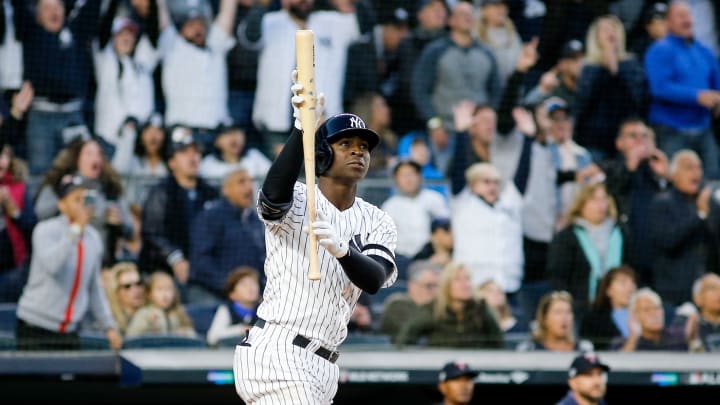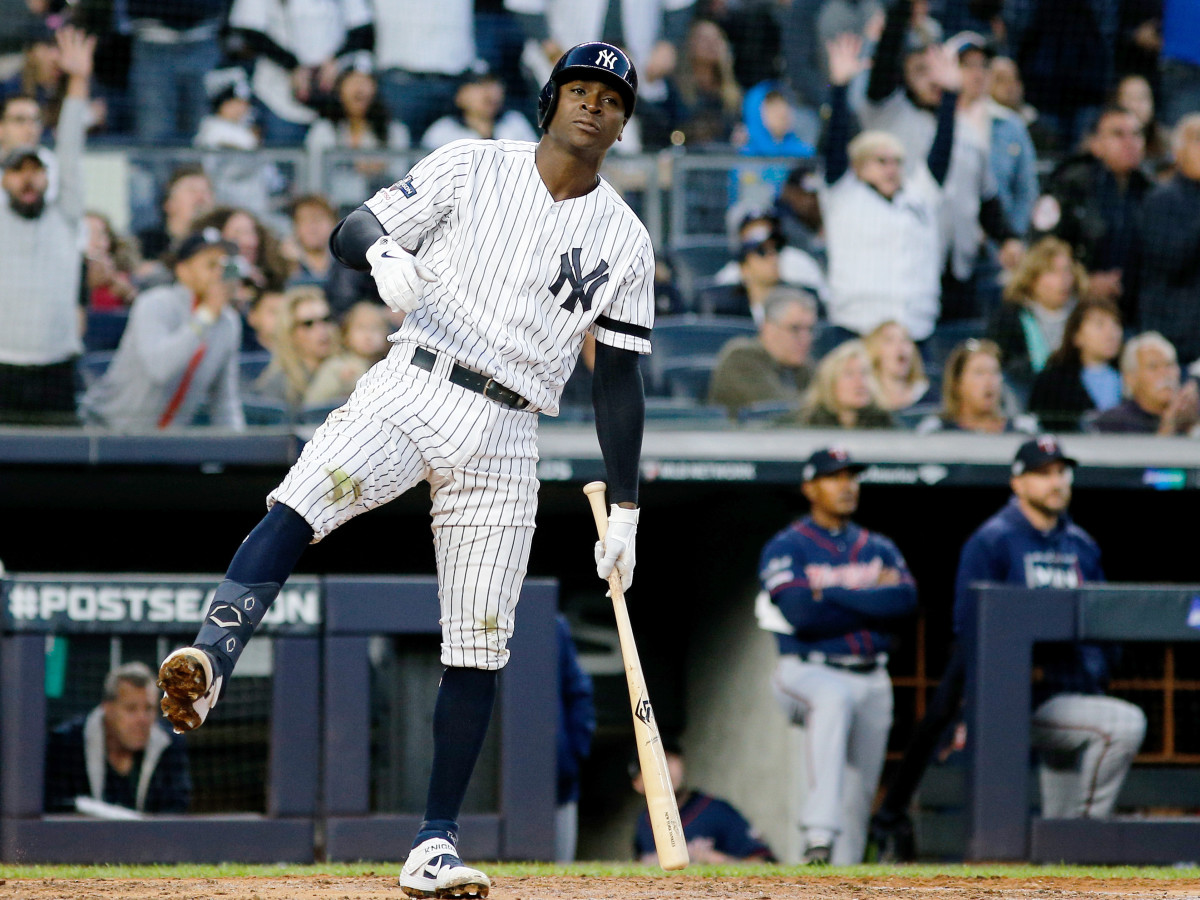Didi Gregorius Could Determine His Fate With Yankees This October


NEW YORK – Yankees shortstop Didi Gregorius turns 30 in February and does not have a contract for next season, which means he has found free agency at a difficult time. Not for two generations has it been a worse time for a position player in their 30s to find regular work in the big leagues. It doesn’t help that Gregorius hit .238 with an OPS+ of 87 in his platform season.
His argument in favor of his worth in a sport that has turned against veterans didn’t wait for the free agent period. It began in Game 2 of the American League Division Series Saturday night at Yankee Stadium with one a swing—a swing exactly like the other 113 in his major-league career that produced a home run. He pulled another pitch into the rightfield seats, this time with the bases loaded in a seven-run third inning.
The Yankees have played 399 postseason games in their franchise history. This happened to be the first time one of their shortstops hit a grand slam. The blast highlighted another blowout win, 8-2, in a non-competitive series against Minnesota.
Dinger Dinger Gregoriouspic.twitter.com/OSSgQmdutN
— SI MLB (@si_mlb) October 5, 2019
“I've been doing the same work I've been doing since I got here,” Gregorius said when asked about a late-season slide. “I didn't try to change anything, just try to swing at strikes. That's one thing for me right now and be patient. I'm just all over the place swinging at almost every ball. I think that's one thing, and be aggressive in the strike zone. That's what I'm trying to do right now.”
Five to 10 years ago Gregorius would have been a hot commodity, with pressure on the Yankees to retain him. His pull-side power, athleticism and magnetic personality that make him a favored teammate are strong assets. A five-year contact seemed reasonable. Think of Jose Reyes at age 29 getting six years and $106 million from the Marlins in 2012. But now the Yankees have Gleyber Torres, 22, who played shortstop at least as well as Gregorius while the incumbent worked his way back from Tommy John surgery in the first half of the season.
Players like Torres are why players like Gregorius are seeing free agent riches drying up. The game is getting younger. More players in their early 20s, better schooled and prepared, are making an immediate impact in the big leagues. And they come more cheaply.
This has dovetailed with the rise of power in the game. Premiums on velocity on the mound and power at the plate favor the younger, fast-firing muscles to deal with these premiums. The shift has been quick.
In 2014, there were 64 qualified hitters in their 30s. This year there were only 40, the lowest per-team rate of everyday players in their 30s since 1976. From 2006 to 2019 everyday jobs for such veterans were cut virtually in half: from 79 to 40. Mike Moustakas, a third baseman, has become the symbol of what happens when really good veterans have trouble finding big multi-year deals.
The shortstop position is especially unwelcome for “older” players. This year the 30 major-league teams trusted only one player past their age 30 season at the position. San Francisco ran Brandon Crawford, 32, the oldest shortstop in baseball, out there for 560 plate appearances. He was awful (.228/.304/.350).
Over the past five years only three qualified shortstops past their age 30 season posted an OPS+ of 100: Zack Cozart, Jhonny Peralta and Troy Tulowitzki, all of whom join Crawford, Reyes, Elvis Andrus and many others who have fallen off a cliff on the aging curve.
Didi Gregorius hit the 12th grand slam in Yankees postseason history and the first since Robinson Cano in 2011; no other franchise has more than 7 postseason grand slams.
— ESPN Stats & Info (@ESPNStatsInfo) October 5, 2019
He is also the 4th shortstop with a postseason grand slam and the first Yankees shortstop to do so. pic.twitter.com/mSqMO75cql
That’s why Gregorius needs to build upon that one swing in Game 2. He needs the showcase of a big October to go make himself the money he lost during the regular season, to leave an impression with the Yankees or any other team that he will blow up the actuarial tables.
His pull-only power is driven by his desire (and need) to hit every pitch well in front of the plate, rather than deep in the hitting area. That means the zone in which he can solidly strike the baseball is so small that it makes him vulnerable to inconsistencies: deep valleys of slumps broken up by intermittent mountains of power when he is on time against fastballs. Over the past two years he has hit 64 percent of his home runs against fastballs.
His at-bat Saturday night might be an indication that he is entering another mountainous period. Minnesota pitcher Tyler Duffey had worked ahead of Gregorius 1-and-2 when he threw a high fastball at 94 mph. As happened regularly down the stretch, Gregorius was late on the pitch and, as he rarely does, fouled it off to the third base side.
Correctly reading the swing, catcher Mitch Garver and Duffey went back to the same pitch. Only this time the high fastball caught a bit more of the fat of the plate, and Gregorius was on time. He caught it out front and smashed it well inside the foul pole in rightfield.
Strangely, Gregorius let his body go a bit limp as the ball dropped into the seats, not too different from using body English to try to keep a ball fair. But Gregorius wasn’t concerned the ball might hook foul. No, it was the look of a man who knew he whiffed the previous day against a Duffey fastball, and whose timing had gone missing for weeks. Cue the “Hallelujah” chorus.
“I was ready for it this time, so that's why my reaction was like that,” he said.

The swing effectively ended the game. The Twins are a game, solid team, but they have been out of their weight class in this series.
They don’t have nearly enough pitchers with the stuff to get out the Yankees by pitching in the strike zone, and they are pitching like they know it. They try to get the Yankees to chase pitches, but that only leads to worse counts and more baserunners. In two games Minnesota has thrown 354 pitches—22.1 per inning, or 88 percent above the major-league average. In 16 innings it has handed the Yankees 17 free baserunners (walks and hit batsmen); eight of them have scored.
The American League this year has been the Yankees and Astros in one class and everybody else in another. Barring Tampa Bay working its mix-and-match pitching matchup, the ALCS may be exactly what has been on the horizon since Opening Day: Houston vs. New York in an epic series.
The Yankees can grind down pitchers just as well as can the Astros. Saturday night provided an indication that New York may be a bit more dangerous if Gregorius, nearly hidden in the eighth spot and owning the kind of rare lefthanded power the Yankees will need against the heavily righthanded-throwing Astros, is entering a hot streak. His next contract may depend on it.
